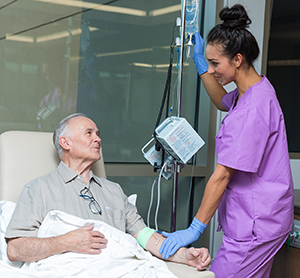Chemotherapy for a Brain Tumor
Chemotherapy for a Brain Tumor

How chemotherapy works
Both normal and cancer cells grow and divide. But cancer cells grow, divide, and spread out of control. Chemotherapy kills growing cells by disturbing their life cycle. But it acts on normal cells as well as cancer cells. Because of this, the medicines can cause side effects. Fast-growing cells are most affected. This includes cells in the hair, digestive system, and blood.
How chemotherapy is given
Chemotherapy is given in cycles. You have periods of rest between the days that the medicines are given. This allows the body to recover and build healthy cells between treatments. You can have your therapy for a brain tumor:
By injection into a vein or artery (IV)
Injected into the spinal canal and cerebrospinal fluid (intrathecal)
By mouth as a pill
As a wafer implanted in the brain
Coping with side effects
Chemotherapy can cause side effects in different parts of your body. Below are some common short-term side effects and tips that may help control them.
For fatigue
Eat a healthy diet and drink plenty of fluids.
Get help with chores.
Get rest as needed.
Consider an exercise program.
For nausea or vomiting
Take antinausea medicine as directed.
Eat small meals during the day.
For diarrhea
Drink more liquids. Ask your pharmacist about drinks that will replace lost electrolytes.
Switch to a BRAT diet. This is a diet of bananas, rice, applesauce, and toast.
Don’t have caffeine, greasy food, spices, beans, or raw fruits and vegetables.
Call your healthcare provider if the diarrhea doesn’t go away or is severe.
For low blood cell counts
A low white blood cell count makes your body less able to fight infection. Wash your hands often. Stay away from crowds and people who are sick.
A low platelet count increases the risk of bleeding. Don't do activities that could cause cuts or bruising.
A low red blood cell count, or anemia, may need to be treated. Call your healthcare provider if you are very tired and pale, short of breath, or have chest pain.
For hair loss
Ask your healthcare team if you are likely to lose hair. Not all chemotherapy medicines will cause hair loss.
Cut your hair short to make hair loss feel less extreme. Or you can choose to shave your head.
Consider wearing a wig, hat, or scarf.
For mouth sores
Brush your teeth after meals to keep your mouth clean and prevent infection. Use a soft toothbrush.
Rinse with baking soda in water.
Possible long-term side effects
Possible long-term side effects depend on the chemo medicines used. They can include:
Infertility
Organ damage
Numbness and tingling in the hands and feet (peripheral neuropathy)
Talk with your healthcare team about the chemo medicines you take and their risks.
Updated:
February 22, 2018
Sources:
Basch, E, Antiemetics American Society of Clinical Oncology Clinical Practice Guidelines Update, Journal of Clinical Oncology (2011)
Reviewed By:
Alteri, Rick, MD,Image reviewed by StayWell art team.,Jasmin, Luc, MD